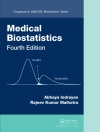Statistical Methods for Dynamic Treatment Regimes shares state of the art of statistical methods developed to address questions of estimation and inference for dynamic treatment regimes, a branch of personalized medicine. This volume demonstrates these methods with their conceptual underpinnings and illustration through analysis of real and simulated data. These methods are immediately applicable to the practice of personalized medicine, which is a medical paradigm that emphasizes the systematic use of individual patient information to optimize patient health care. This is the first single source to provide an overview of methodology and results gathered from journals, proceedings, and technical reports with the goal of orienting researchers to the field. The first chapter establishes context for the statistical reader in the landscape of personalized medicine. Readers need only have familiarity with elementary calculus, linear algebra, and basic large-sample theory to use this text. Throughout the text, authors direct readers to available code or packages in different statistical languages to facilitate implementation. In cases where code does not already exist, the authors provide analytic approaches in sufficient detail that any researcher with knowledge of statistical programming could implement the methods from scratch. This will be an important volume for a wide range of researchers, including statisticians, epidemiologists, medical researchers, and machine learning researchers interested in medical applications. Advanced graduate students in statistics and biostatistics will also find material in Statistical Methods for Dynamic Treatment Regimes to be a critical part of their studies.
Spis treści
Introduction.- The Data: Observational Studies and Sequentially Randomized Trials.- Statistical Reinforcement Learning.- Estimation of Optimal DTRs by Modeling Contrasts of Conditional Mean Outcomes.- Estimation of Optimal DTRs by Directly Modeling Regimes.- G-computation: Parametric Estimation of Optimal DTRs.- Estimation DTRs for Alternative Outcome Types.- Inference and Non-regularity.- Additional Considerations and Final Thoughts.- Glossary.- Index.- References.
O autorze
Bibhas Chakraborty is an Assistant Professor of Biostatistics at the Mailman School of Public Health, Columbia University. His primary research interests lie in dynamic treatment regimes, machine learning and data mining including reinforcement learning, causal inference, and design and analysis of clinical trials. He received a Bachelor’s degree from the University of Calcutta, a Master’s degree from the Indian Statistical Institute, and a Ph.D. in Statistics from the University of Michigan. He is the recipient of the Calderone Research Prize for Junior Faculty from the Mailman School of Public Health, Columbia University, in 2011.Erica Moodie is an Associate Professor of Biostatistics in the Department of Epidemiology, Biostatistics, and Occupational Health at Mc Gill University. Her main interests lie in causal inference and longitudinal data with a focus on methods for HIV research. She is an Associate Editor of The International Journal of Biostatistics and Journal of Causal Inference. She received a bachelor’s degree in Mathematics and Statistics from the University of Winnipeg, an M.Phil. in Epidemiology from the University of Cambridge, and a Ph.D. in Biostatistics from the University of Washington. She is the recipient of a Natural Sciences and Engineering Research Council University Faculty Award.












